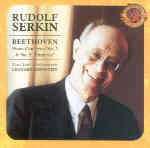The Masterworks Expanded Edition transfers of these oft- reissued performances are the most vivid and detailed I’ve heard, on par with their French Sony Rudolf Serkin Edition and Bernstein Century counterparts. A slight decrease in tape hiss this time around does not at all affect the overall sonic picture. Serkin’s tensile, muscular pianism in the C minor concerto’s outer movements makes a visceral impact that perfectly suits the defiant qualities that characterize middle-period Beethoven. His spacious phrasing in the slow movement proves how you don’t have to be a colorist in order to achieve a focused, shapely legato. However, those who prefer more tonal heft and lyrical generosity might favor Rubinstein’s recording with Erich Leinsdorf, recorded three years after Serkin’s 1964 effort. Leonard Bernstein’s energized podium support sometimes makes a blustery and rushed impact in the big tuttis that will exhilarate some listeners but exasperate others (I prefer the more compact transparency Bernstein brought to the same work when he led the Columbia Symphony with soloist Glenn Gould). At the same time, you can’t discount the New York Philharmonic’s wonderful first-desk solos and full-bodied yet never cloying string section.
Under Bernstein’s exuberant baton, certain details in the Emperor concerto draw attention to the conductor rather than to the composer (the unwritten trumpet crescendos in the opening cadenza, for instance), while others illuminate Beethoven, such as the conductor’s unusual attention to the imitative string writing at measures 107-120. Normally the latter transitional passage transpires without incident because the pianist’s passagework dominates. My comments about the Third concerto vis-à-vis Serkin’s contribution apply as well to the Emperor, although I find his two earlier studio Emperors marginally more fluid and supple from a technical standpoint. For the obligatory bonus track, Sony tacks on the Rondo from Beethoven’s “Pathétique” sonata. Since this series already offers a release containing the whole “Pathétique” plus Serkin’s “Moonlight”, “Appassionata,” and “Les Adieux”, we need this bonus like a fifth wheel.
































